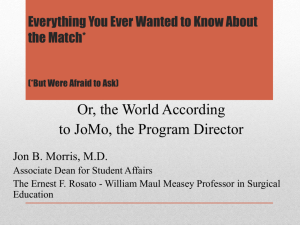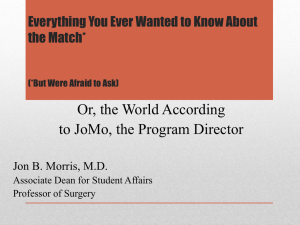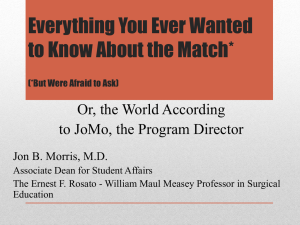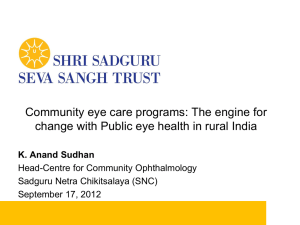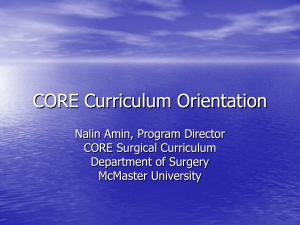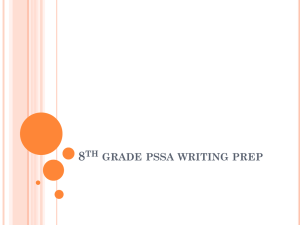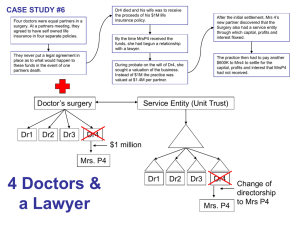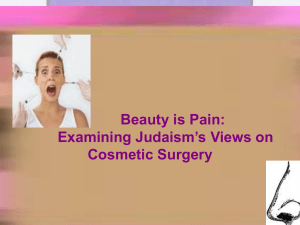Match According to JoMo 2014-2015
advertisement
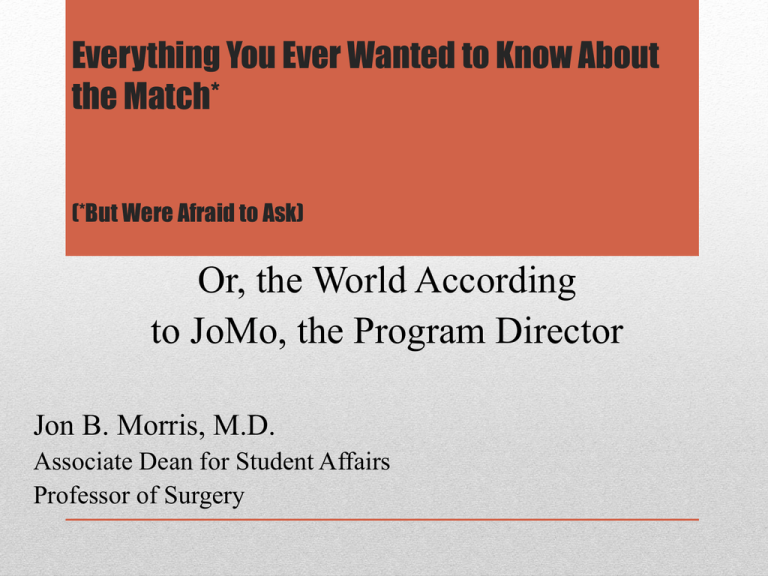
Everything You Ever Wanted to Know About the Match* (*But Were Afraid to Ask) Or, the World According to JoMo, the Program Director Jon B. Morris, M.D. Associate Dean for Student Affairs Professor of Surgery Letters of Recommendation MSPE Crafted by OSA JoMo Meetings – Reality Therapy April Class Meeting #1 May June Class Meeting #2 July Aug. Sept. Interview Workshop Class Meeting Oct. MSPE Released Oct. 1 The Process (April-Nov. 2014) Nov. Interviews Advocacy Call October November December January February Rank List Deadline (Applicants & Programs) March Match Day The Process (Nov. – March 2015) Anatomy of the MSPE • Identifying Information • Unique Characteristics (Two 125 word paragraphs) • Academic History (matriculation, graduation, combined degree, repeat/remediate, adverse actions, gaps, leaves of absence) • Academic Progress (the “cut and paste”) • Preclinical Basic Science • Core Clinical • Electives • Combined Degree Summary • MD/PhD Summary • Masters Degree Summary • Summary Paragraph • Bottom Line MSPE Bottom Line Distribution Class of 2011 Class of 2012 Class of 2013 Class of 2014 Top of the Class 4% 6% 5% 9% Outstanding 29% 31% 38% 55% Excellent-Outstanding 25% 33% 22% - Excellent 37% 27% 32% 34% Very Good to Excellent 3% 3% 3% 2% Very Good 2% - - - Good - - - - AOA Alpha Omega Alpha Honor Medical Society Criteria/Selection 1/6th of Class Eligible Academics Research Extra Curricular Selection Process Students Notified by Sept. 1 (ERAS) Will be Mentioned in MSPE JoMo’s Rules Everything is Discoverable Nothing is Off the Record Everything Gets Back to the Program Director High Contact Areas: Applicants and Programs Phone Conversations Email Receptions Tours Interviews The Interview – The Basics Are You a Human Being? Did You Do Your Homework? Post-Interview Strategy: Rules of Engagement PD/Applicants may volunteer information but cannot coerce or pressure each other. Required Reading Manipulation and the Match By Carl Erik Fisher, M.D. JAMA, September 23/30, 2009 – Vol. 302. No. 12 The Goal of Coercion PDs – want to convince all applicants that they are takes. Applicants – want to convince all programs they are coming. The Tools of Coercion Letters Email Phone Calls Second Visits The Language of Coercion Applicants: I loved your program. I will be ranking you highly. You are at the top of my list. I would be honored and thrilled to train at your program. The Language of Coercion Program Directors How are your other interviews going? If you want to match with us, let us know. How seriously are you considering our program? Why would you want to come to our program? Rising on a Rank Order List Be a Superstar Passive Osmotic Ascent Advocacy Call Rank Order List Strategy: Getting to the Top Ranked to Match 10 20 Take Group (3 cycles) 30 40 50 Bubble 60 70 80 DNR • Assume a program takes 10 categorical residents. • Assume the program interviews 100 applicants. • The advocacy call has its greatest impact on the bubble group. 90 100 Why Would a PD Respond to an Advocacy Call? PD is a human being PDs want applicants that want their program The selection process is not infallible Why Some Don’t Match • • • • Applied to inadequate number of programs Disconnect between academic record and career choice Interview Performance Bad luck The Golden Rule of ROL Creation • Only rank programs where you would be willing to train. Do not rank any program that you do not wish to attend. Penn Med Residency Match Data Total graduates Total residency placements Matching at University Program 2013 160 2014 171 157 164 149/157 = 94% 157/164 = 96% Specialty Match Data Specialty Anesthesiology Dermatology Emergency Medicine Family Medicine Internal Medicine Medicine/Dermatology Neurological Surgery Neurology Obstetrics and Gynecology Ophthalmology Oral Maxillo Facial Surgery Orthopaedic Surgery Otolaryngology Pathology Pediatrics Plastic Surgery Psychiatry Radiation Oncology Radiology-Diagnostic Surgery Urology Total # of % of Students Students Matching Surgery & Surgical # of % of Students Specialties Students Matching 4 7 17 2 32 1 3 8 2.4 4.3 10.4 1.2 19.5 0.6 1.8 4.9 10 13 6 7.9 3 9 8 3 14 1 4 4 7 11 3 1.8 5.5 4.9 1.8 8.5 0.6 2.4 2.4 4.3 6.7 1.8 Total Family Medicine Internal Medicine Pediatrics 2 32 14 1.2 19.5 8.5 164 99.7% Total 48 29.20% General Surgery Neurosurgery Ophthalmology 11 3 13 6.7 1.8 7.9 Oral Maxillo Facial Surgery Orthopaedic Surgery Otolaryngology Plastic Surgery Urology 3 9 8 1 3 1.8 5.5 4.9 0.6 1.8 51 30% Primary Care # of % of Students Students Matching Matching at Penn, 2014 Number of Students % of Students Matching Total 42 26% HUP 35 22% CHOP 5 3% Scheie 2 1% Penn Hospital 0 0% Matches at Other Premier Institutions: Class of 2014 Institution Harvard • Brigham & Women’s Hospital • Children’s Hospital Boston • Massachusetts's General Hospital # of Students Matched 26 Total (9) (3) (14) University of California San Francisco (UCSF) 12 New York University 9 Weill Cornell Medical Center 6 Barnes Jewish/Washington University 4 Johns Hopkins 4 Columbia University Medical Center 4 University of Michigan 4 University of Washington 4 University of California Los Angeles 2 University of Texas Southwestern 2 University of Virginia 2 Stanford 1 University of Chicago 1 University of Miami Bascom Palmer 1 University of Pittsburgh 1 University of Texas MD Anderson 1 What You Need to Do • Meet with JoMo before Sept. 1st • • • • • Tuesdays and Friday mornings Call 215-898-7190, or email osa@mail.med.upenn.edu YOU MUST MAKE AN APPOINTMENT BEFORE MAY 15, 2014! No JoMo = No MSPE Remember Early Match Programs - Ophthalmology, Urology • Unique Characteristics Paragraphs • Submit to OSA by June 1st Unique Characteristics Paragraphs • Due to osa@mail.med.upenn.edu by June 1, 2014 These paragraphs should be no more than 250 words total. An additional paragraph may be added for time spent doing a year out. Each paragraph is to be written in the third person. See the Student Portal for samples. Paragraph 1: • The introduction is a succinct chronology of a student’s entry and progress through medical school. Pre-matriculation academic, social or employment background characteristics may be included. Paragraph should include: • • • • • College, degree date, major, minor Advanced Degrees Membership in honors societies, graduation honors, significant extra-curricular activities If you did not enter med school immediately after graduation, describe your activities Paragraph 2: Paragraph should include: • • • Employment, extra-curricular activities (e.g. triathlon, raised quintuplets, etc..), committees, class officer Fellowships, awards, accomplishments If you took a year off, please include your activities What You Need to Do • Personal Statement • Solicit Letters of Recommendation • Next class meeting – late May • MyERAS opens; students may begin working on application – Mid- April • ERAS Opens to Programs – Sept. 15th
